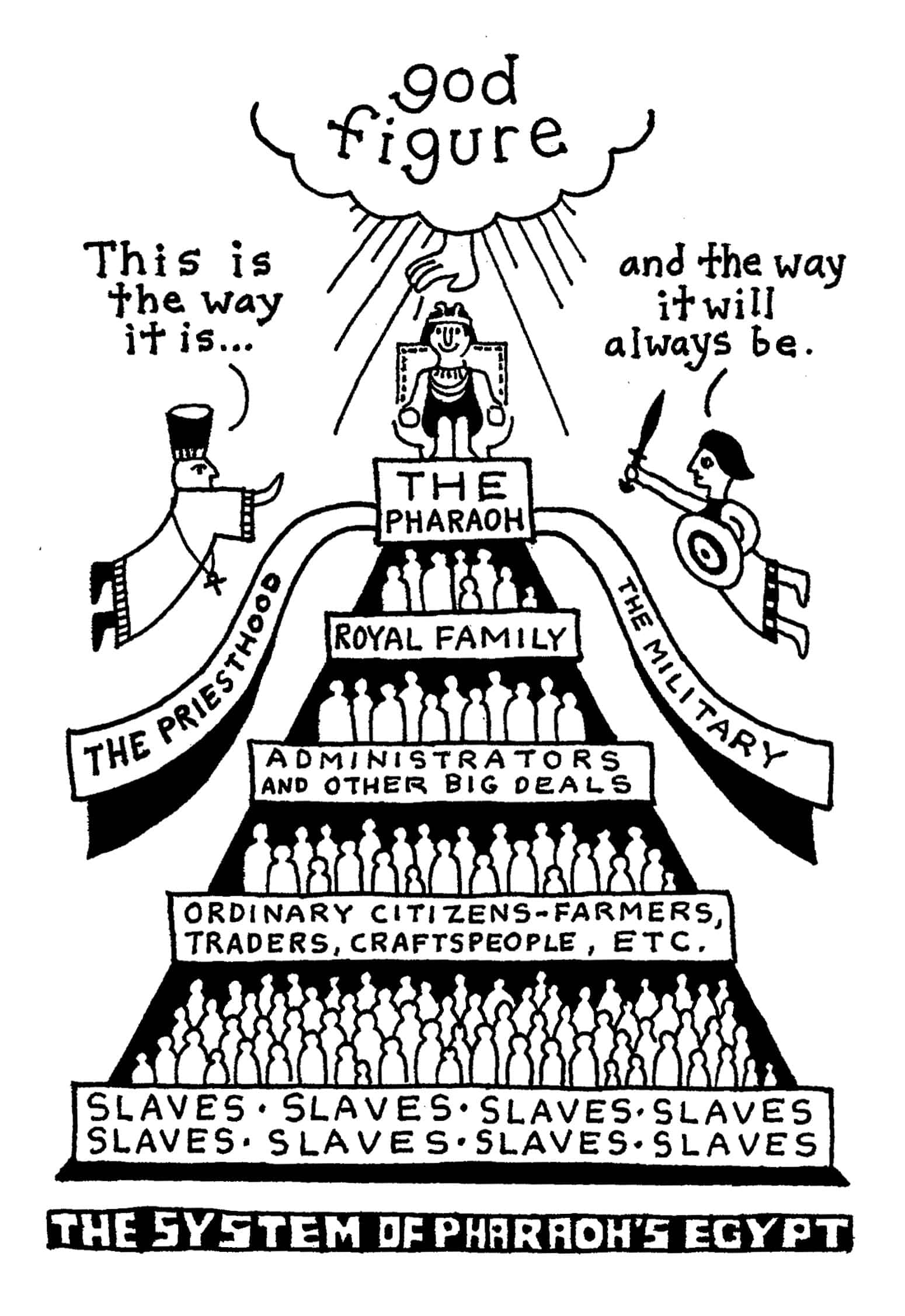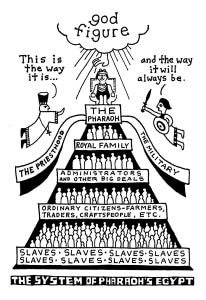A New King Arose Who Did Not Know Moses
Organizational Chart of Pharaoh’s Egypt in the days of Moses
It’s hard to understand what’s going on in Israel, Gaza, and throughout the Holy Land without a grasp on the religious background. My knowledge of Islam is scant, but my knowledge of Judaism is better because the Hebrew scriptures lead into my own Christian tradition. And what I know of the Hebrew scriptures brings me great grief as I look at what is going on in Gaza, the West Bank, and throughout Israel.
The first two books of the Torah — Genesis and Exodus, in more common parlance — tell two grand stories central to the Jewish people, and by extension, to my own Christian brothers and sisters as well. Over the last several years, and especially since the Hamas attack in early October, these two stories have been echoing through my head, especially with respect to Benjamin Netanyahu, his far-right cabinet, their supporters in Israel, and the dangerous political path they all are following.
The book of Genesis tells the stories of origins – the origin of the world, and the origin of the people of Israel as God’s chosen ones. Genesis ends with the story of Joseph and his brothers, ten older and one younger. The short version of the story is that Joseph was his father’s favorite, so much so that his older brothers were filled with anger, jealousy, and envy. One day, while the brothers were away from home, they beat Joseph and sold him into slavery in Egypt, then told their father that a wild animal had attacked and killed him. While in Egypt, Joseph came to the attention of the pharaoh, and interpreted a dream of pharaoh’s that foretold seven years of great harvests, followed by seven years of severe drought. Pharaoh listened, and stored up grain in the good years, and he named Joseph as the administrator of the grain program. When the drought arrived, Joseph’s brothers back home were caught in it, and came to Egypt to find grain. Joseph recognized them, but they did not recognize him. When Joseph finally revealed himself to them, they feared he would take revenge. Instead, Joseph offered forgiveness. “What you intended for evil, God intended for good.” Joseph told his brothers that while they let their anger rule, God was using Joseph to prepare for the great famine, and thus save his whole family. Because of Joseph’s great service to the pharaoh and all of Egypt, Joseph and his brothers were invited to stay in Egypt, and they did. Genesis ends with reconciliation between the brothers, the forebears of the twelve tribes of Israel.
Where Genesis was about the Lord and the relationships between the insiders, the brothers (and later, the tribes), Exodus is about the Lord and the relationships between the Israelites and the aliens, the non-Israelites. Exodus takes up the Genesis story generations later, when the Israelites had grown numerous in Egypt and “a new king arose who did not know Joseph.” Instead of continuing to respect what Joseph had done long before, the new king feared all these foreigners and ordered them enslaved. The Lord chose Moses to lead them out of slavery, and after a grand struggle (the ten plagues sent to torment Pharaoh), they left Egypt and entered the wilderness, moving toward the Promised Land. God gave Moses the ten commandments, and Moses spent the wilderness years teaching the newly-liberated children of Israel what it means to live as God’s people.
As the Lord spoke with Moses throughout these wilderness years, the Lord had a refrain for Moses and the children of Israel: “Remember that you were a slave in Egypt.” God was not simply reminding them that things were rough in the past. Instead, God was telling the children of Israel how they are to live in the the present and the future, saying in essence: “You used to be slaves, and I didn’t bring you out of slavery so you can become slave owners yourselves.” For example, consider the Lord’s words from Deuteronomy 24 (New Revised Standard Version, with emphasis added):
17 You shall not deprive a resident alien or an orphan of justice; you shall not take a widow’s garment in pledge. 18 Remember that you were a slave in Egypt and the LORD your God redeemed you from there; therefore I command you to do this. 19 When you reap your harvest in your field and forget a sheaf in the field, you shall not go back to get it; it shall be left for the alien, the orphan, and the widow, so that the LORD your God may bless you in all your undertakings. 20 When you beat your olive trees, do not strip what is left; it shall be for the alien, the orphan, and the widow. 21 When you gather the grapes of your vineyard, do not glean what is left; it shall be for the alien, the orphan, and the widow. 22 Remember that you were a slave in the land of Egypt; therefore I am commanding you to do this.
You are not to be oppressors, said the Lord to Moses and the people, but you are to treat others as you were *not* treated when you were slaves in Egypt. Remember your heritage, said the Lord, and therefore care for the poor, the widow, the orphan, and the alien.
Can you see why passages like these have been echoing in my head in these last few months?
There is a difference between protecting yourself and taking vengeance, and Netanayhu and his allies have been confusing the former for the latter. Around 1200 were killed by Hamas last October and another 200 or so were taken hostage. In return, Israel has killed tens of thousands, leveled entire neighborhoods, forced hundreds of thousands to leave the rubble and seek new homes, and plunged the entire Gaza strip into hunger. Throughout the West Bank and often with explicit support of political leaders in Jerusalem, Israeli settlers have become more brazen in attacking their non-Jewish neighbors, taking their homes and land in violation of Israel’s own laws and international treaties to which Israel is a party.
There is a non-trivial segment of the Israeli political world that does not remember that they were slaves in the land of Egypt, and that the Lord does not want them to be slave-owners. The far-right in Israel, who claim that Israel should possess everything from the Jordan to the Mediterranean Sea, is particularly firm in demanding that non-Jews of all stripes have no rights and no place in this land, because this is the land God promised only to them. Slowly but surely, the rights of non-Jews in Israel have been circumscribed, limited, and even taken away, such that the South African-born Israeli journalist Benjamin Pogrund, a Jew, has begun describing Israel using a word he long opposed using: apartheid. As he wrote last August — before the Hamas attack:
Israel 2023, South Africa 1948. I’ve lived through it before: power grabbing, fascism and racism – the destruction of democracy. Israel is going where South Africa was 75 years ago. It’s like watching the replay of a horror movie.
In 1948, as a teenager in Cape Town, I followed the results of the 26 May election on a giant board on a newspaper building. The winner-takes-all electoral system produced distorted results: the Afrikaner Nationalist party, with its smaller partner, won 79 parliamentary seats against 74 for the United party and its smaller partner.
But the Nats, as they were called, in fact won only 37.7% of the vote against the opposition’s 49.2%. Although the opposition received more votes, the Nats said they had a majority and could do what they wanted.
In the Israel of 2023, I’m reliving some of these same experiences.
[snip]
We deny Palestinians any hope of freedom or normal lives. We believe our own propaganda that a few million people will meekly accept perpetual inferiority and oppression. The government is driving Israel deeper and deeper into inhuman, cruel behaviour beyond any defence. I don’t have to be religious to know that this is a shameful betrayal of Jewish morality and history.
What was it that the Lord said to Moses and the children of Israel? Oh, yes: “Remember that you were a slave in Egypt . . .”
Pogrund remembers, and his whole piece is worth reading. Sadly, the events of the last five months have made it even more true than the day it was written. I read his piece when it first appeared last August, but these words from near the end continue to echo in my head even today:
We are at the mercy of fascists and racists (both carefully chosen words) who cannot, and will not, stop.
I write about South Africa and Israel because I know both of them, 53 years in one and nearly 26 years in the other. Neither is unique. The same pattern of rightwing repression has happened in our time in Hungary and Poland, in Asia, Africa and Latin America, and earlier in Europe in the 1920s and 1930s.
I did not want to write this article. It was torn out of me, addressed to Israelis because the rightwing government is taking the country into institutionalised discrimination and racism. This is apartheid. South Africa under apartheid was straightforward: white v black. Israel is complex. The 21% Arab minority has the vote. Everyone pays the same national insurance and enjoys the same benefits – medical and social welfare. In hospital, I, a Jew, share a room with Arabs and we are cared for by the same Jewish and Arab doctors and nurses. Everything is open: beaches, park benches, movies, theatres, restaurants. The apartheid label is correct, but caution and thought are needed about comparisons.
In Israel, I am now witnessing the apartheid with which I grew up. Israel is giving a gift to its enemies in the Boycott, Divestment and Sanctions (BDS) movement and its allies, especially in South Africa, where denial of Israel’s existence is intense among many black people, in trade unions and communist and Muslim circles. BDS activists will continue to make their claims, out of ignorance and/or malevolence, spreading lies about Israel. They have long distorted what is already bad into grotesqueness, but will now claim vindication. Israel is giving them truth.
I didn’t want to write this post, either. But I look at and listen to the Jews who are protesting the actions of the Netanyahu government and their supporters, who sound more and more like the biblical prophets of old, calling the leaders of Israel to account. I look and I listen, and I could no longer remain silent. The complexity of Israel that Pogrund wrote about last summer is disappearing, faster and faster each day.
Because Bibi Netanyahu is the new king who did not know Moses.
______
Image h/t to Pastor Daniel Erlander, from his excellent book Manna and Mercy: A Brief History of God’s Unfolding Promise to Mend the Entire Universe.


